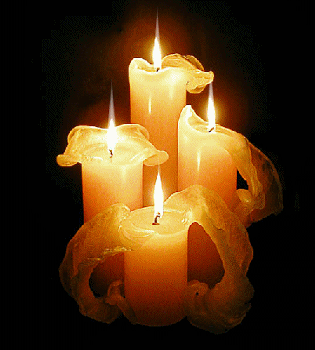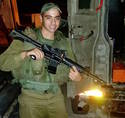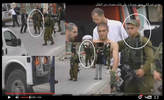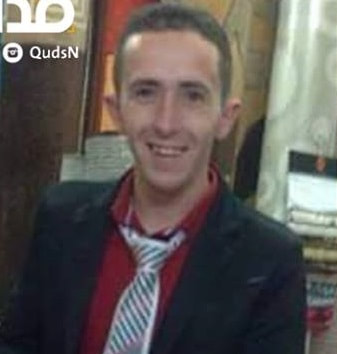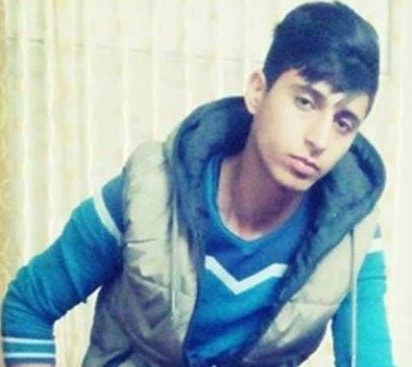31 mar 2016
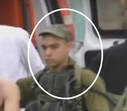
New details emerge of the moments after the the soldier shot a terrorist who was lying on the ground. 'He stabbed my friend. He deserves to die,' the solider is alleged to have said.
An Israeli military court announced the fourth extension of remand for the soldier documented shooting an already-neutralized terrorist in Hebron. Pending further developments, the soldier will be held until 1pm on Friday. New details have emerged which strengthen suspicions against the soldier.
Amongst these new details are claims that he changed his testimony, that he lost the trust of his commanders, and that he shot the terrorist after taking off his helmet at the scene.
The IDF prosecutor, Lt. Col. Adorm Rigler, said in the hearing that "the soldier shot without any operational necessity. Additional suspicion has been aroused due to evidence that came up over the past two days against the suspect. This suspicion is based on a video which was filmed in real time and documented the suspect's actions."
The case against the soldier was further strengthened by what the soldier was quoted as saying after the event. According to the company commander, after confronting the soldier about the incident, the soldier said, "The terrorist was alive. He should die."
The soldier who shot at the terrorist reportedly said this seconds after the event, and other eyewitnesses confirmed that this was said. The suspect is also alleged to have said that "the terrorist stabbed my friend. He they deserve to die." Two other soldiers confirmed that before the event the suspect said, "The terrorist stabbed my friend."
These quotes may indicate the state of mind and motivations of the soldier.
The prosecution also says that the soldier's claimed reasons for the attack — that there was a clear and present danger to his life — are not in fact true. According to the prosecutor, "The suspect's claims are different than what he said in real time, and, therefore, his testimony was false."
Chaos outside the courtroom: 'You've abandoned a soldier in the field'
A protest gathered outside of the courtroom where the hearing took place, with demonstrators calling to "send the boy home." They then used speakers to blast the song The Medic's Ballad, performed by Yehoram Gaon.
Amongst the protestors was Ron Carmi from Nes Ziona, who yelled into the microphone towards the courthouse, "I am addressing the soldier's commanders: Take your things and leave, you clowns! You abandoned a solider in the field and are letting him bleed. You should have insisted to be in the cell with him, even if he made a mistake, even if he was enraged. We will not forgive, and we will not forget, and we will also settle our score with the politicians. Judge Ronen Shorr, you have no right to decide what this man's sentence will be. You should resign."
On Sunday: The autopsy
The High Court of Justice ruled that there will be an autopsy of the terrorist, which will be carried out on Sunday, against the initial wishes of the terrorist's family.
Supreme Court Justice Meni Mazuz said to the family's representative, "Pathological science is science. There isn't 'Palestinian' science, there isn't 'Arab' science, and there isn't 'American' science. Everything is done by the same methods as with everyone else. Four different parties getting involved can't result in anything good. It can cause further complications, especially if is going to be a criminal investigation. Your pathologist can be there too."
An Israeli military court announced the fourth extension of remand for the soldier documented shooting an already-neutralized terrorist in Hebron. Pending further developments, the soldier will be held until 1pm on Friday. New details have emerged which strengthen suspicions against the soldier.
Amongst these new details are claims that he changed his testimony, that he lost the trust of his commanders, and that he shot the terrorist after taking off his helmet at the scene.
The IDF prosecutor, Lt. Col. Adorm Rigler, said in the hearing that "the soldier shot without any operational necessity. Additional suspicion has been aroused due to evidence that came up over the past two days against the suspect. This suspicion is based on a video which was filmed in real time and documented the suspect's actions."
The case against the soldier was further strengthened by what the soldier was quoted as saying after the event. According to the company commander, after confronting the soldier about the incident, the soldier said, "The terrorist was alive. He should die."
The soldier who shot at the terrorist reportedly said this seconds after the event, and other eyewitnesses confirmed that this was said. The suspect is also alleged to have said that "the terrorist stabbed my friend. He they deserve to die." Two other soldiers confirmed that before the event the suspect said, "The terrorist stabbed my friend."
These quotes may indicate the state of mind and motivations of the soldier.
The prosecution also says that the soldier's claimed reasons for the attack — that there was a clear and present danger to his life — are not in fact true. According to the prosecutor, "The suspect's claims are different than what he said in real time, and, therefore, his testimony was false."
Chaos outside the courtroom: 'You've abandoned a soldier in the field'
A protest gathered outside of the courtroom where the hearing took place, with demonstrators calling to "send the boy home." They then used speakers to blast the song The Medic's Ballad, performed by Yehoram Gaon.
Amongst the protestors was Ron Carmi from Nes Ziona, who yelled into the microphone towards the courthouse, "I am addressing the soldier's commanders: Take your things and leave, you clowns! You abandoned a solider in the field and are letting him bleed. You should have insisted to be in the cell with him, even if he made a mistake, even if he was enraged. We will not forgive, and we will not forget, and we will also settle our score with the politicians. Judge Ronen Shorr, you have no right to decide what this man's sentence will be. You should resign."
On Sunday: The autopsy
The High Court of Justice ruled that there will be an autopsy of the terrorist, which will be carried out on Sunday, against the initial wishes of the terrorist's family.
Supreme Court Justice Meni Mazuz said to the family's representative, "Pathological science is science. There isn't 'Palestinian' science, there isn't 'Arab' science, and there isn't 'American' science. Everything is done by the same methods as with everyone else. Four different parties getting involved can't result in anything good. It can cause further complications, especially if is going to be a criminal investigation. Your pathologist can be there too."
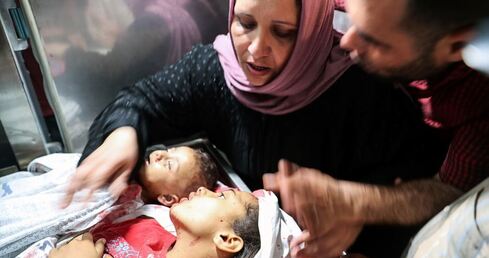
The Israeli army ruled Thursday that an Israeli soldier who shot dead a wounded Palestinian in Hebron last week would be tried on charges of manslaughter, and not, as had been widely expected, those of murder.
While it was not initially clear why the soldier would be tried on the lighter charges, the announcement came after a week of political turbulence in Israel in which many politicians who initially condemned the killing of Abed al-Fattah al-Sharif later appeared to reverse their positions.
According to Israeli daily Haaretz, Israeli military prosecutor Aduram Riegler told the Israeli military court Thursday the soldier was suspected of deliberately shooting al-Sharif "without need from an operational standpoint."
Al-Sharif was lying on the ground severely wounded when he was killed. He had earlier been gunned down after allegedly stabbing an Israeli soldier.
Riegler said during the hearing that evidence indicated that contrary to the soldier's claims, he had not shot al-Sharif out of fear for his life.
"In response to a question by the company commander, who was there and stood near the terrorist and asked the suspect why he opened fire, the suspect replied: 'the terrorist was alive, he deserved to die,'" Haaretz quoted Riegler as saying.
"These quotes contain no claims of a life-threatening situation, and show the suspect's motives and his mood in real time. As we know the suspect's version (suggesting a life-threatening situation) developed at a later stage," he said.
During the hearing, the commander of the soldier’s battalion said the soldier had been immediately suspended from combat duty because he lied about the reason he opened fire, Haaretz reported.
The prosecutor called for an extension of the soldier's remand by at least another week.
Prior to Thursday's hearing, it had been widely expected the soldier would be charged with murder, the worst offense a soldier in Israel's army may be charged with.
However, the army had not confirmed this, and Riegler said Tuesday that "murder, manslaughter and causing death through negligence were among the possibilities under consideration."
While politicians initially roundly condemned the killing in Hebron last week -- which the UN branded an "extrajudicial execution" -- much of their initial language has since been either reversed or watered down.
Israeli Prime Minister Benjamin Netanyahu at first said the killing did not represent the Israeli army's values, but has since sought to be seen as closely allied to Israel's armed forces, saying on Wednesday that the army and police "do not engage in executions."
He said: "Israel's soldiers and police officers defend themselves and innocent civilians with the highest moral standards against bloodthirsty terrorists who come to murder them."
While it was not initially clear why the soldier would be tried on the lighter charges, the announcement came after a week of political turbulence in Israel in which many politicians who initially condemned the killing of Abed al-Fattah al-Sharif later appeared to reverse their positions.
According to Israeli daily Haaretz, Israeli military prosecutor Aduram Riegler told the Israeli military court Thursday the soldier was suspected of deliberately shooting al-Sharif "without need from an operational standpoint."
Al-Sharif was lying on the ground severely wounded when he was killed. He had earlier been gunned down after allegedly stabbing an Israeli soldier.
Riegler said during the hearing that evidence indicated that contrary to the soldier's claims, he had not shot al-Sharif out of fear for his life.
"In response to a question by the company commander, who was there and stood near the terrorist and asked the suspect why he opened fire, the suspect replied: 'the terrorist was alive, he deserved to die,'" Haaretz quoted Riegler as saying.
"These quotes contain no claims of a life-threatening situation, and show the suspect's motives and his mood in real time. As we know the suspect's version (suggesting a life-threatening situation) developed at a later stage," he said.
During the hearing, the commander of the soldier’s battalion said the soldier had been immediately suspended from combat duty because he lied about the reason he opened fire, Haaretz reported.
The prosecutor called for an extension of the soldier's remand by at least another week.
Prior to Thursday's hearing, it had been widely expected the soldier would be charged with murder, the worst offense a soldier in Israel's army may be charged with.
However, the army had not confirmed this, and Riegler said Tuesday that "murder, manslaughter and causing death through negligence were among the possibilities under consideration."
While politicians initially roundly condemned the killing in Hebron last week -- which the UN branded an "extrajudicial execution" -- much of their initial language has since been either reversed or watered down.
Israeli Prime Minister Benjamin Netanyahu at first said the killing did not represent the Israeli army's values, but has since sought to be seen as closely allied to Israel's armed forces, saying on Wednesday that the army and police "do not engage in executions."
He said: "Israel's soldiers and police officers defend themselves and innocent civilians with the highest moral standards against bloodthirsty terrorists who come to murder them."
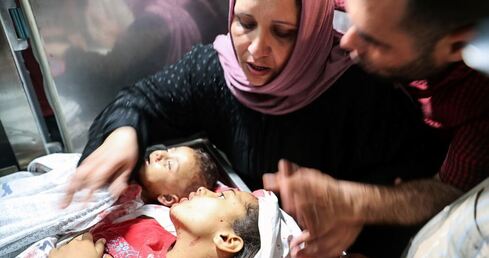
Israel's top court on Thursday refused an appeal to allow a Palestinian doctor to participate in the autopsy of Abdul-Fattah al-Sharif, a Palestinian who was shot in the head by an Israeli soldier while he lay wounded on the ground in Hebron last week.
Israeli authorities initially agreed to allow a Palestinian doctor inside the room while the autopsy was conducted to take notes, but al-Sharif's family rejected the offer, demanding that a Palestinian take part in the autopsy itself.
Ahmad Safiya, a lawyer for the Palestinian Prisoner's Society said the Israeli Supreme Court refused the appeal, and ordered that Safiya be notified of the date of autopsy so he would be able to issue a permit for a Palestinian doctor to attend as previously agreed.
The Israeli prosecution informed him that it would take place next Sunday.
Graphic video footage of al-Sharif's killing has been met with wide condemnation from rights groups and international bodies, with the UN and a group of US congressmen demanding investigations into the soldier's apparent "extrajudicial execution."
"We are concerned this killing may not be a lone incident," UN High Commissioner for Human Rights, Rupert Colville said in a recent statement, adding that "all incidents where security forces have caused death or injury should be fully investigated, and those responsible brought to account."
A number of Palestinian families signed a letter late last year demanding that families should be allotted time to request an official autopsy report on their dead relatives. Autopsy reports are used in official paperwork necessary to file cases against Israeli authorities at the International Criminal Court.
Palestinians have historically distrusted Israeli military investigations and the ability of Israeli authorities to conduct unbiased autopsies of Palestinians slain by Israeli forces, and rights groups have repeatedly criticized Israel for offering impunity to Israelis who harm Palestinians.
Israeli authorities initially agreed to allow a Palestinian doctor inside the room while the autopsy was conducted to take notes, but al-Sharif's family rejected the offer, demanding that a Palestinian take part in the autopsy itself.
Ahmad Safiya, a lawyer for the Palestinian Prisoner's Society said the Israeli Supreme Court refused the appeal, and ordered that Safiya be notified of the date of autopsy so he would be able to issue a permit for a Palestinian doctor to attend as previously agreed.
The Israeli prosecution informed him that it would take place next Sunday.
Graphic video footage of al-Sharif's killing has been met with wide condemnation from rights groups and international bodies, with the UN and a group of US congressmen demanding investigations into the soldier's apparent "extrajudicial execution."
"We are concerned this killing may not be a lone incident," UN High Commissioner for Human Rights, Rupert Colville said in a recent statement, adding that "all incidents where security forces have caused death or injury should be fully investigated, and those responsible brought to account."
A number of Palestinian families signed a letter late last year demanding that families should be allotted time to request an official autopsy report on their dead relatives. Autopsy reports are used in official paperwork necessary to file cases against Israeli authorities at the International Criminal Court.
Palestinians have historically distrusted Israeli military investigations and the ability of Israeli authorities to conduct unbiased autopsies of Palestinians slain by Israeli forces, and rights groups have repeatedly criticized Israel for offering impunity to Israelis who harm Palestinians.

In the wake of Sen. Patrick Leahy's request that US Sec. of State John Kerry investigate Israel for alleged 'gross violations of human rights', Netanyahu demands to know where the concern is for Israelis murdered by 'these savage terrorists'.
Prime Minister Benjamin Netanyahu scolded US Sen. Patrick Leahy (D-Vt.) on Wednesday for requesting that US Secretary of State John Kerry investigate Israel for alleged “gross violations of human rights,” in a February letter leaked to Politico.
“The IDF and the Israel Police do not engage in executions,” Netanyahu responded sharply. “Israel’s soldiers and police officers defend themselves and innocent civilians with the highest moral standards against bloodthirsty terrorists who come to murder them.”
Netanyahu further admonished Leahy, “Where is the concern for the human rights of the many Israelis who’ve been murdered and maimed by these savage terrorists? This letter should have been addressed instead to those who incite youngsters to commit cruel acts of terrorism.”
Leahy’s letter, dated February 17, 2016 and addressed to Kerry, requested that the US State Department provide information on whether American aid to Israel and Egypt is contributing to “possible gross violations of human rights.”
Significantly, Leahy is the author of the “Leahy Law,” which prohibits the US government from providing foreign military aid to governments that violate human rights. About 75% of all US foreign military aid goes to Israel and Egypt—Israel receives an annual sum of US$3.1 billion, while Egypt gets US$1.3 billion.
The letter, in effect, suggested that aid to Israel and Egypt would be illegal under the Leahy Law and must cease.
Leahy cited reports by Amnesty International of “what may be extrajudicial killings” of several Palestinians, listing five by name. The list begins with Fadi Alloun, who was shot in Jerusalem after stabbing a fifteen-year-old Israeli boy in October—this, shortly after Alloun posted on Facebook, “Either martyrdom or victory.”
Netanyahu’s reaction comes on the same day as IDF Chief of Staff Lt. Gen. Gadi Eisenkot issued a special memorandum to Israel’s armed forces clarifying its regulations on the use of force.
“The fate of Israel depends on two things: its strength and its righteousness,” the memo quotes from David Ben Gurion, Israel’s first prime minister.
“We will continue to support any soldier who errs in the heat of battle,” Eisenkot continues, “but we will not hesitate to bring to justice soldiers and commanders who stray from the operational and moral standards under which we operate.”
Prime Minister Benjamin Netanyahu scolded US Sen. Patrick Leahy (D-Vt.) on Wednesday for requesting that US Secretary of State John Kerry investigate Israel for alleged “gross violations of human rights,” in a February letter leaked to Politico.
“The IDF and the Israel Police do not engage in executions,” Netanyahu responded sharply. “Israel’s soldiers and police officers defend themselves and innocent civilians with the highest moral standards against bloodthirsty terrorists who come to murder them.”
Netanyahu further admonished Leahy, “Where is the concern for the human rights of the many Israelis who’ve been murdered and maimed by these savage terrorists? This letter should have been addressed instead to those who incite youngsters to commit cruel acts of terrorism.”
Leahy’s letter, dated February 17, 2016 and addressed to Kerry, requested that the US State Department provide information on whether American aid to Israel and Egypt is contributing to “possible gross violations of human rights.”
Significantly, Leahy is the author of the “Leahy Law,” which prohibits the US government from providing foreign military aid to governments that violate human rights. About 75% of all US foreign military aid goes to Israel and Egypt—Israel receives an annual sum of US$3.1 billion, while Egypt gets US$1.3 billion.
The letter, in effect, suggested that aid to Israel and Egypt would be illegal under the Leahy Law and must cease.
Leahy cited reports by Amnesty International of “what may be extrajudicial killings” of several Palestinians, listing five by name. The list begins with Fadi Alloun, who was shot in Jerusalem after stabbing a fifteen-year-old Israeli boy in October—this, shortly after Alloun posted on Facebook, “Either martyrdom or victory.”
Netanyahu’s reaction comes on the same day as IDF Chief of Staff Lt. Gen. Gadi Eisenkot issued a special memorandum to Israel’s armed forces clarifying its regulations on the use of force.
“The fate of Israel depends on two things: its strength and its righteousness,” the memo quotes from David Ben Gurion, Israel’s first prime minister.
“We will continue to support any soldier who errs in the heat of battle,” Eisenkot continues, “but we will not hesitate to bring to justice soldiers and commanders who stray from the operational and moral standards under which we operate.”
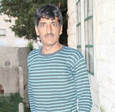
Imad Abu Shamsiyya
Israeli forces, on Tuesday night, broke into the home of the videographer who filmed an Israeli soldier executing a wounded Palestinian in cold blood, in Tel Rumeida, central Hebron, last week.
The videographer, activist Imad Abu Shamsiyya, said that soldiers broke into his home in Tel Rumeida, and inspected the cards of the local and international activists who were staying in the house, as well.
The activists gathered there after Israeli settlers directed death threats against Imad, as they published his photos with “Most Wanted” written on them, in addition to killing threats.
Last Thursday, according to the PNN, Imad recorded a shocking video showing an Israeli soldier, who was later identified as Elor Azarya, executing a helpless 21-year-old Palestinian who was already shot and bleeding, after an Israeli settler told him, “This asshole here is still breathing.”
At the same spot, 21-year-old Ramzi Qassrawi was also killed, with the military claiming that the two attempted a stabbing attack.
As for the soldier, Israeli forces claimed that he was suspended and sent to investigation, while his right-wing government is still defending his claims, saying, “He did the right thing at the right time.”
Israeli forces, on Tuesday night, broke into the home of the videographer who filmed an Israeli soldier executing a wounded Palestinian in cold blood, in Tel Rumeida, central Hebron, last week.
The videographer, activist Imad Abu Shamsiyya, said that soldiers broke into his home in Tel Rumeida, and inspected the cards of the local and international activists who were staying in the house, as well.
The activists gathered there after Israeli settlers directed death threats against Imad, as they published his photos with “Most Wanted” written on them, in addition to killing threats.
Last Thursday, according to the PNN, Imad recorded a shocking video showing an Israeli soldier, who was later identified as Elor Azarya, executing a helpless 21-year-old Palestinian who was already shot and bleeding, after an Israeli settler told him, “This asshole here is still breathing.”
At the same spot, 21-year-old Ramzi Qassrawi was also killed, with the military claiming that the two attempted a stabbing attack.
As for the soldier, Israeli forces claimed that he was suspended and sent to investigation, while his right-wing government is still defending his claims, saying, “He did the right thing at the right time.”
30 mar 2016
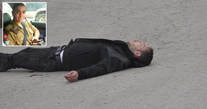
By Ramzy Baroud
Abed al-Fattah Yusri al-Sharif was killed. In the style typical of Israeli aggression against unarmed Palestinians, he was first wounded after allegedly attempting to stab an Israel occupation soldier in the occupied city of Hebron. He lies on his back, his arms stretched across the road, and his head moving about.
A soldier confers with his superior officer, before moving to “confirm the kill” – a term used by the Israeli military in reference to field executions of Palestinians. The soldier walks to Abed, lying on the ground and clearly posing no threat to anyone – and, in full view of onlookers, shoots him in the head.
The above scene would have been relegated to the annals of the many “contested” killings by Israeli soldiers, were it not for a Palestinian field worker with Israel’s human rights group, B’Tselem, who filmed the bloody event.
Culture of Impunity
The incident once more highlights a culture of impunity that exists in the Israeli army which is not a new phenomenon. Decades ago, there was no equivalent to media such as B’Tselem, Breaking the Silence, or Machsom (Checkpoint) Watch, no social media to spread the news, and few international groups that cared to report on Israel’s violent birth.
Instead, thousands of Jewish militiamen roamed Palestinian towns and villages, armed with a mandate to ethnically cleanse an entire nation within months. Thousands of Palestinians were killed in the “cleansing” process, so Israel could proclaim itself independent.
Israeli poet, Natan Alterman, attempted to convey an instance of the horror inflicted by Jewish gangs, which later formed the Israeli army, proclaimed by some as the “most moral army in the world“:
“Across the vanquished city in a jeep he did speed –
A lad bold and armed, a young lion of a lad!
And an old man and a woman on that very street
Cowered against a wall, in fear of him clad.
Said the lad smiling, milk teeth shining:
‘I’ll try the machinegun’ … and put it into play!
To hide his face in his hands, the old man barely had time
When his blood on the wall was sprayed.”
The poem entitled About This was published on November 19, 1948, when Israel had almost completely secured the self-imposed borders of its new state, assigning Palestinians to perpetual exile – a journey of pain and blood that is yet to conclude.
Natan Alterman, tried, although failed, to “break the silence” on Israeli impunity.
No Accountability
Since then, despite their insistence on embracing life with hope, Palestinian history continues to be delineated by charts crowded with endless bloody statistics. Palestinians are under attack – systematic, government-led, ordered, or encouraged attacks that point at only one unmistakable conclusion: Israel strives to perpetuate violence and war.
This is a grounded in the fact that Israel has been created through war, and has convinced itself that it can only survive through war. The result is a terrifying culture of violence and impunity – of men and women armed with machine guns, and children who are taught that violence is the only language that their Arab enemies understand.
The Palestinian, for them, only exists to be subdued, controlled, “cleansed” and – when necessary – killed.
Recently, Israel’s chief Sephardic Rabbi Yitzhak Yosef had called on Israelis to kill any Palestinian they believe poses a threat, with no regard for the law or the High Court of Justice. But, for Yosef, the “High Court of Justice”, is already on his side.
Indeed, it was Israel’s judiciary that had approved “targeted killings” of Palestinians suspected of allegedly committing or planning to commit acts of violence.
According to the Palestinian Centre for Human Rights (PCHR), between September 2000 and March 2008, 500 Palestinians were assassinated by the Israeli army; 228 Palestinian civilians were also killed in what was consigned as “collateral damage”.
Among those pulverised by Israeli missiles were 77 children. No one was ever held accountable for those murders. If one is to list the crimes that are committed routinely by the Israeli army, the list would be endless.
The above statistics are a mere glance at a culture that has no regard for Palestinians, thus violating every written or implied rule of war of military ethics or occupation under international law.
Armed settlers rampage through villages of occupied West Bank and the neighbourhoods of East Jerusalem. The number of their violent crimes have grown tremendously in recent years, and even doubled since 2009.
In August 2015, months before the current uprising, Human Rights Watch senior researcher, Bill Van Esveld, wrote: “Settlers attack Palestinians and their property on a near-daily basis; there were more than 300 such attacks last year, but few attackers faced justice.
In the past decade, less than two percent of investigations into settler attacks ended with convictions.” These settlers complete the violent rule expected of them, alongside the more violent Israeli army.
In December 2015 Israel’s 972Mag wrote about the hundreds of violent incidents of Israeli forces targeting Palestinian medical staff. Palestinian rights group, Al-Haq, documented 56 cases in which “ambulances were attacked”, and 116 assaults against medical staff while on duty.
No One is Immune to Violence
In Palestine, no one is immune to violence. Young and old are shot for the mere suspicion that they may pose danger to the life of Israeli Jews; and Israelis who dare report on these very incidents are shunned by their own society.
Israel’s Defence Minister, Moshe Yaalon, recently accused Breaking the Silence of committing treason. The supposedly traitorous act of that small Israeli NGO –powered mostly by volunteers – was collecting testimonies by Israeli soldiers and whistle-blowers as evidence that the army is violating Israeli and international law.
Meanwhile, the government is itself actively pushing for yet new laws that criminalise dissent in Israel.
One of such bills, championed by Prime Minister Benjamin Netanyahu himself, would allow elected members of the Knesset to vote to oust their own elected peers. While Israel’s culture of license to do as it pleases is older than the state itself, it is fed by a right-wing ruling elite that incessantly promotes fear and disseminates a confining siege mentality.
“At the end, in the State of Israel, as I see it, there will be a fence that spans it all,”said Netanyahu in February. “In the area that we live, we must defend ourselves against the wild beasts.”
Netanyahu is of course, never a fan of the truth or common sense. His last war on Gaza in the summer of 2014 had killed a total of 2,251 Palestinians – including 1,462 civilians, among them 551 children, according to a report prepared by the UN Human Rights Council. During that war, only six Israeli civilians were killed, and 60 soldiers.
Who, then, is truly the “wild beast”? Majority of Israelis have long been sold on the idea that their country, despite its brutality is a “villa in the jungle”.
According to a recent Pew survey, nearly half of Israelis want to expel Palestinians Arabs – Muslims and Christians – from their ancestral homeland. In the government, the judiciary, the army, society and the country’s highest moral authorities, which advocate violence and ethnic cleansing and promote genocidal activities, what options are left for Palestinians?
The danger of impunity is not merely the lack of legal accountability, but the fact that it is the very foundation of most violent crimes against humanity. This impunity began seven decades ago, and it will not end without international intervention, and concerted efforts to hold Israel accountable and bring the agony of Palestinians to a halt.
(This article was first published in Al Jazeera) – Dr. Ramzy Baroud has been writing about the Middle East for over 20 years. He is an internationally-syndicated columnist, a media consultant, an author of several books and the founder of PalestineChronicle.com.
Chief of Staff: We will prosecute those who defy IDF's values
In a letter published to soldiers Gadi Eisenkot states 'We will not waver in prosecuting soldiers and commanders who defy IDF's operational and moral standards'.
In the wake of last Thursday's shooting incident in the Tel Rumeida neighborhood of Hebron, IDF Chief of Staff Gadi Eisenkot sent a letter to soldiers Wednesday morning stating, "We will not waver in prosecuting soldiers and commanders, who defy the IDF's operational and moral standards."
At the beginning of the letter, Eisenkot said, "In recent months, we have dealt with terror attacks against Israeli citizens, which seek to undermine the strength of the state. The IDF aims to maintain the safety of Israeli citizens and residents on the battlefield and the home front. The IDF indeed works with vigor and dedication and operates in all arenas freely, employing all means necessary. In my field tours, I am proud to see you making progress and preparing to sacrifice yourselves to protect the homeland."
The Chief of Staff cited the words of David Ben Gurion, according to which " The fate of Israel depends on two factors: her strength and her rectitude.” He wrote that the IDF has always sanctified the values of human dignity and the purity of arms, values based on Jewish heritage. Every action must be performed professionally, using measured force so that the mission is accomplished in accordance with the IDF’s values.
Eisenkot stressed that he and the officers will continue to back every soldier who errs in the heat of battle. However, they will must not deviate from the IDF’s ethical code. “Keeping the spirit of the IDF and its values is not a right but a duty, in order to preserve the IDF as the protector of the people in a Jewish and democratic state.”
Abed al-Fattah Yusri al-Sharif was killed. In the style typical of Israeli aggression against unarmed Palestinians, he was first wounded after allegedly attempting to stab an Israel occupation soldier in the occupied city of Hebron. He lies on his back, his arms stretched across the road, and his head moving about.
A soldier confers with his superior officer, before moving to “confirm the kill” – a term used by the Israeli military in reference to field executions of Palestinians. The soldier walks to Abed, lying on the ground and clearly posing no threat to anyone – and, in full view of onlookers, shoots him in the head.
The above scene would have been relegated to the annals of the many “contested” killings by Israeli soldiers, were it not for a Palestinian field worker with Israel’s human rights group, B’Tselem, who filmed the bloody event.
Culture of Impunity
The incident once more highlights a culture of impunity that exists in the Israeli army which is not a new phenomenon. Decades ago, there was no equivalent to media such as B’Tselem, Breaking the Silence, or Machsom (Checkpoint) Watch, no social media to spread the news, and few international groups that cared to report on Israel’s violent birth.
Instead, thousands of Jewish militiamen roamed Palestinian towns and villages, armed with a mandate to ethnically cleanse an entire nation within months. Thousands of Palestinians were killed in the “cleansing” process, so Israel could proclaim itself independent.
Israeli poet, Natan Alterman, attempted to convey an instance of the horror inflicted by Jewish gangs, which later formed the Israeli army, proclaimed by some as the “most moral army in the world“:
“Across the vanquished city in a jeep he did speed –
A lad bold and armed, a young lion of a lad!
And an old man and a woman on that very street
Cowered against a wall, in fear of him clad.
Said the lad smiling, milk teeth shining:
‘I’ll try the machinegun’ … and put it into play!
To hide his face in his hands, the old man barely had time
When his blood on the wall was sprayed.”
The poem entitled About This was published on November 19, 1948, when Israel had almost completely secured the self-imposed borders of its new state, assigning Palestinians to perpetual exile – a journey of pain and blood that is yet to conclude.
Natan Alterman, tried, although failed, to “break the silence” on Israeli impunity.
No Accountability
Since then, despite their insistence on embracing life with hope, Palestinian history continues to be delineated by charts crowded with endless bloody statistics. Palestinians are under attack – systematic, government-led, ordered, or encouraged attacks that point at only one unmistakable conclusion: Israel strives to perpetuate violence and war.
This is a grounded in the fact that Israel has been created through war, and has convinced itself that it can only survive through war. The result is a terrifying culture of violence and impunity – of men and women armed with machine guns, and children who are taught that violence is the only language that their Arab enemies understand.
The Palestinian, for them, only exists to be subdued, controlled, “cleansed” and – when necessary – killed.
Recently, Israel’s chief Sephardic Rabbi Yitzhak Yosef had called on Israelis to kill any Palestinian they believe poses a threat, with no regard for the law or the High Court of Justice. But, for Yosef, the “High Court of Justice”, is already on his side.
Indeed, it was Israel’s judiciary that had approved “targeted killings” of Palestinians suspected of allegedly committing or planning to commit acts of violence.
According to the Palestinian Centre for Human Rights (PCHR), between September 2000 and March 2008, 500 Palestinians were assassinated by the Israeli army; 228 Palestinian civilians were also killed in what was consigned as “collateral damage”.
Among those pulverised by Israeli missiles were 77 children. No one was ever held accountable for those murders. If one is to list the crimes that are committed routinely by the Israeli army, the list would be endless.
The above statistics are a mere glance at a culture that has no regard for Palestinians, thus violating every written or implied rule of war of military ethics or occupation under international law.
Armed settlers rampage through villages of occupied West Bank and the neighbourhoods of East Jerusalem. The number of their violent crimes have grown tremendously in recent years, and even doubled since 2009.
In August 2015, months before the current uprising, Human Rights Watch senior researcher, Bill Van Esveld, wrote: “Settlers attack Palestinians and their property on a near-daily basis; there were more than 300 such attacks last year, but few attackers faced justice.
In the past decade, less than two percent of investigations into settler attacks ended with convictions.” These settlers complete the violent rule expected of them, alongside the more violent Israeli army.
In December 2015 Israel’s 972Mag wrote about the hundreds of violent incidents of Israeli forces targeting Palestinian medical staff. Palestinian rights group, Al-Haq, documented 56 cases in which “ambulances were attacked”, and 116 assaults against medical staff while on duty.
No One is Immune to Violence
In Palestine, no one is immune to violence. Young and old are shot for the mere suspicion that they may pose danger to the life of Israeli Jews; and Israelis who dare report on these very incidents are shunned by their own society.
Israel’s Defence Minister, Moshe Yaalon, recently accused Breaking the Silence of committing treason. The supposedly traitorous act of that small Israeli NGO –powered mostly by volunteers – was collecting testimonies by Israeli soldiers and whistle-blowers as evidence that the army is violating Israeli and international law.
Meanwhile, the government is itself actively pushing for yet new laws that criminalise dissent in Israel.
One of such bills, championed by Prime Minister Benjamin Netanyahu himself, would allow elected members of the Knesset to vote to oust their own elected peers. While Israel’s culture of license to do as it pleases is older than the state itself, it is fed by a right-wing ruling elite that incessantly promotes fear and disseminates a confining siege mentality.
“At the end, in the State of Israel, as I see it, there will be a fence that spans it all,”said Netanyahu in February. “In the area that we live, we must defend ourselves against the wild beasts.”
Netanyahu is of course, never a fan of the truth or common sense. His last war on Gaza in the summer of 2014 had killed a total of 2,251 Palestinians – including 1,462 civilians, among them 551 children, according to a report prepared by the UN Human Rights Council. During that war, only six Israeli civilians were killed, and 60 soldiers.
Who, then, is truly the “wild beast”? Majority of Israelis have long been sold on the idea that their country, despite its brutality is a “villa in the jungle”.
According to a recent Pew survey, nearly half of Israelis want to expel Palestinians Arabs – Muslims and Christians – from their ancestral homeland. In the government, the judiciary, the army, society and the country’s highest moral authorities, which advocate violence and ethnic cleansing and promote genocidal activities, what options are left for Palestinians?
The danger of impunity is not merely the lack of legal accountability, but the fact that it is the very foundation of most violent crimes against humanity. This impunity began seven decades ago, and it will not end without international intervention, and concerted efforts to hold Israel accountable and bring the agony of Palestinians to a halt.
(This article was first published in Al Jazeera) – Dr. Ramzy Baroud has been writing about the Middle East for over 20 years. He is an internationally-syndicated columnist, a media consultant, an author of several books and the founder of PalestineChronicle.com.
Chief of Staff: We will prosecute those who defy IDF's values
In a letter published to soldiers Gadi Eisenkot states 'We will not waver in prosecuting soldiers and commanders who defy IDF's operational and moral standards'.
In the wake of last Thursday's shooting incident in the Tel Rumeida neighborhood of Hebron, IDF Chief of Staff Gadi Eisenkot sent a letter to soldiers Wednesday morning stating, "We will not waver in prosecuting soldiers and commanders, who defy the IDF's operational and moral standards."
At the beginning of the letter, Eisenkot said, "In recent months, we have dealt with terror attacks against Israeli citizens, which seek to undermine the strength of the state. The IDF aims to maintain the safety of Israeli citizens and residents on the battlefield and the home front. The IDF indeed works with vigor and dedication and operates in all arenas freely, employing all means necessary. In my field tours, I am proud to see you making progress and preparing to sacrifice yourselves to protect the homeland."
The Chief of Staff cited the words of David Ben Gurion, according to which " The fate of Israel depends on two factors: her strength and her rectitude.” He wrote that the IDF has always sanctified the values of human dignity and the purity of arms, values based on Jewish heritage. Every action must be performed professionally, using measured force so that the mission is accomplished in accordance with the IDF’s values.
Eisenkot stressed that he and the officers will continue to back every soldier who errs in the heat of battle. However, they will must not deviate from the IDF’s ethical code. “Keeping the spirit of the IDF and its values is not a right but a duty, in order to preserve the IDF as the protector of the people in a Jewish and democratic state.”
